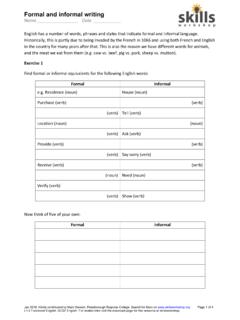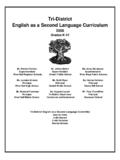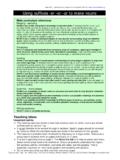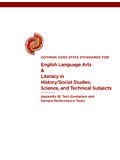Transcription of From Zero to Greek: An Introduction to the Language for ...
1 From zero to greek : An Introduction to the Language for Everyone A pre-Institute workshop at American Classical League 61st Annual Institute, Durham, NH. Holloway Commons: Cocheco Room Thursday June 26, 6-9pm & Friday June 27, 2008 8-11am Wilfred Major Louisiana State University, Baton Rouge, Louisiana Byron Stayskal Western Washington University, Bellingham, Washington Deborah Davies Brooks School, North Andover, Massachusetts Participants in this workshop will receive information, practice, and materials for introducing and building up instruction in greek at a school or program.
2 No knowledge (or recollection) of greek is required. The workshop has three components: (1) a survey of and practice with the basics of the greek Language (2) models and materials for introducing greek , especially at the stage when it is not yet possible to offer a full class in greek (3) instruction in preparing students for the first levels of the National greek Exam. Deb Davies administers the National greek Exam ( ), about which detailed information, syllabus, and more appear in this packet. Wilfred Major (chair) and Byron Stayskal are part of the Committee for the Promotion of greek (CPG), a subcommittee of the National Committee for the Promotion of Latin and greek (NCLG; ).
3 All the information in this packet and other materials are available for free download at (you will be redirected to the site's current location).. Fear not! . Luke This Packet Contains Frequently Asked Questions about Ancient greek o Historical Overview of Greece o Types of greek from Linear B to Modern greek o Typing and Printing greek o Textbooks and Resources for Beginning greek National greek Exam o Results for the 2008 Exams o Information about the 2009 Exams o Syllabus for the Introduction to greek Exam A survey of the cultural information on the syllabus for the " Introduction to greek " level of the National greek Exam (sections II and III).
4 O greek Geography o Historical Events and People A survey of the Language information on the syllabus for the " Introduction to greek ". level of the National greek Exam (sections I and V). o The Alphabet o Overview of greek Grammar o Understanding greek text Verbs Nouns Prepositions Adverbs and Conjunctions Derivatives on the syllabus for the " Introduction to greek " level of the National greek Exam (section IV). National greek Exam o Copy of the 2008 Introduction to greek Exam o Application for 2009 Exams vocabulary lists Sample promotional materials for greek 2.
5 Historical Overview of Greece Reference works frequently refer to various historical periods without mentioning the rough dates or order of these periods, so here is a very brief overview of the principal historical stages of greek history. The Bronze Age (3000-1200 BC). o This is, broadly speaking, the period and world behind the myths of the Trojan War. Other than such myths told in later times, we know of this period only through archaeological remains. o During this time lived a people now called the Minoans (although no one knows what they were called at the time).
6 They left behind many spectacular buildings and beautiful art, especially on the island of Crete. They spoke a non- greek Language which has not been identified. o Greeks of this period are usually referred to as Mycenaeans, referring to the city of Mycenae, home of Agamemnon and one of the most powerful greek cities of the time. o No literature survives from this time period. Documents (see Linear B in "Types of greek ") are the only writing to survive. Dark Age (1200-700 BC). o For unknown reasons, crises afflict people all around the Mediterranean area.
7 Archaeology indicates much depopulation, movement, and poverty. o No greek writing of any sort survives from this period. Stories about the Bronze Age are told orally. Archaic Period (700-500 BC). o Greece recovers from the Dark Age. Cities like Athens, Sparta, Corinth and Thebes become powerful and prosperous. These cities are often best known for the powerful "tyrants" which ruled during this time. o The greek alphabet appears for the first time. The Iliad, Odyssey, Hesiod, and other poems, which had been recited orally over the years, are now written down.
8 Fragments remain of "lyric poets" such as Sappho and Archilochus. Aesop supposedly lived during this time. Classical Period (500-323 BC). o Athens establishes the first democracy. They repel the Persian attacks of Darius and Xerxes (490-480 BC). Pericles guides the Athenian empire and has the Parthenon built. Athens and Sparta fight the Peloponnesian War (431-404 BC). Shortly after Alexander the Great (356-323 BC) dies, Macedonians take over Athens and end the democracy. o Most famous greek literature comes from Athens during this era: the tragedies of Aeschylus, Sophocles, and Euripides, the comedies of Aristophanes, the historical writings of Herodotus, Thucydides and Xenophon, the philosophical writings of Plato and Aristotle, and almost all greek oratory.
9 Hellenistic Period (323-30 BC). o Following the death of Alexander the Great, various peoples around the Mediterranean attempt to recreate and control the empire he built. Macedonian and greek culture dominate the methods of empire-building during this period. 3. Cleopatra VII was the last Hellenistic ruler and her suicide in 30 BC in the wake of Octavian/Augustus' attack marks the end of this era. o Apollonius of Rhodes' Argonautica (his Medea influenced Virgil's Dido). survives, as does much scholarly poetry which influenced Catullus, Horace, Ovid, and others.
10 Some greek New Comedy (models for Plautus and Terence) survives. Dionysius of Halicarnassus wrote scholarship and Roman history. Diodorus Siculus compiles a world history. The Hebrew Bible is translated into greek (known as the Septuagint). Roman Period (196 BC AD 476). o Greece is "liberated" and made a province of the Roman Empire. By the end, the capital of the empire has moved to the greek city of Byzantium (as "Constantinople") c. AD 330. o Plutarch writes his "Parallel Lives" of famous Greeks and Romans plus many more essays.












